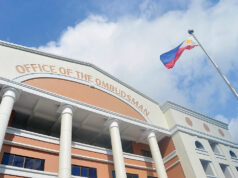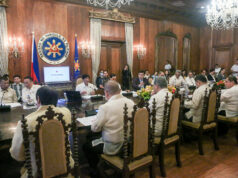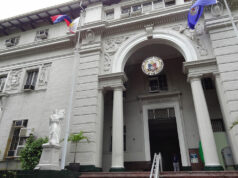PACC wants additional powers and jurisdiction
By Arjay L. Balinbin, Reporter
THE PRESIDENTIAL Anti-Corruption Commission (PACC) is preparing to ask President Rodrigo R. Duterte to grant the agency prosecutorial powers and expand its jurisdiction.
PACC Chairman Dante L. Jimenez, in a phone interview with BusinessWorld last Dec. 21, said the “number one goal” of the commission next year is to “request the President to strengthen [its] mandate.”
“We just came from Beijing and Hong Kong to visit our counterparts… we learned that ang kanilang mga (their) anti-corruption agencies can investigate and can even prosecute,” he said.
In comparison, Mr. Jimenez said the PACC remains very “anemic” after eight months of works since March.”
“So we will request the President to strengthen further the PACC,” he said, adding that this could be one step closer to institutionalizing the agency through legislation.
Asked if the commission wants prosecutorial powers as well, he said: “Yes, katulad sa (like the) Independent Commission Against Corruption (ICAC) of Hong Kong, they can investigate, they can prosecute and at the same time [it has a program on] prevention and education.”
Whether these powers, once granted, will not overlap with the duties of the Ombudsman, Mr. Jimenez said: “Wala namang problema ‘yun. Pwede naming magtulungan. Sa dami ng problema sa corruption, at sa bagal ng Ombudsman, eh ‘di kaya nila (That won’t be a problem. We can help each other. With all the problems on corruption, and the slowness of the Ombudsman, they really can’t handle it all).”
The expansion of jurisdiction they will recommend includes handling cases of government workers below the salary grade 26 level.
Alongside the expansion of powers and jurisdiction, he said the PACC’s manpower should also be increased as well as provided with its own budget, little-by-little, “pero dapat ma-prove muna namin sarili namin (but we should prove ourselves first).”
On the other hand, lawyer and Ateneo Policy Center research fellow Michael Henry Ll. Yusingco said in an e-mail to BusinessWorld on Dec. 25, “For me, it does not matter what the PACC aims to do. I am totally against its very existence.”
“For further explanation, please let me share an old op-ed piece of mine,” he added, referring to his commentary titled “Rethinking the Anti-Corruption Mandate” that was first published on Mindanews in 2016.
In his article, Mr. Yusingco argued that having different offices that handle corruption complaints will inevitably result in a “turf war.”
“As we have seen many times in the past, the ‘turf war’ syndrome has afflicted the various anti-corruption offices. And if not engaged in the blame game, officials of these agencies rarely coordinate with each other. The ultimate effect of having multiple offices undertaking anti-corruption functions is the dilution of resources. Spreading funds across different agencies performing the same mandate is obviously counter-productive,” he explained.
The PACC was formed in 2017 through Executive Order No. 43. The commission operates under the Office of the President and is primarily made up of a chairperson and four commissioners.
The commission was established in the wake of Mr. Duterte’s criticisms against former ombudsman Conchita Carpio-Morales, whose office is constitutionally mandated to investigate public officers or employees and government agencies.
“There is a need to create a separate commission under the Office of the President solely dedicated to providing assistance to the President in the investigation and hearing of administrative cases and complaints, and in the conduct of lifestyle checks and/or fact-finding inquiries concerning presidential appointees and other public officers allegedly involved in graft and corrupt practices, or have committed other high crimes and/or violations of the Code of Conduct and Ethical Standards for Public Officials and Employees,” the EO reads.



